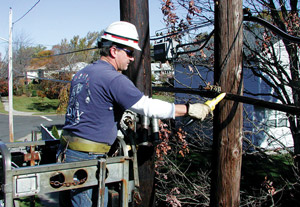Search News
For the Media
For media inquiries, call CWA Communications at 202-434-1168 or email comms@cwa-union.org. To read about CWA Members, Leadership or Industries, visit our About page.
Also in Spring 2012
- A day of stress and a long drive home
- Notice Regarding Union Security Agreements and Agency Fee Objections
- Safe-Patient-Handling Program Reduces Workers' Injuries
- In New Mexico, Patient Control is Challenge for Mental Health Workers
- "Prevention 360" Targets Workplace Injuries in Manufacturing
- Only in the Aircraft Cabin Can a "Workday" Equal 16 Hours
- Media Workers Put Their Safety on the Line
- Violence in the Workplace, New Manual
- Protecting AT&T Technicians from Street Violence
- Cal OSHA Report Contradicts UCLA on Lab Incident
- Working Together: Our Work Environment and How We Change It
- First-ever Criminal Charges Proceeding in UCLA Lab Fire
- Heat Stress, a Burning Issue for Outside Telecom Techs
- For N.J. Child Protective Services Workers, Violence Comes with the Job
- Strong New Workplace Violence Language At Kaleida Healthcare
Electrical Hazards: An Everyday Danger for Telecom Technicians
 Electrocution remains an everyday danger for CWA telecom technicians. Since 2006, at least six techs have died on the job. |
Working around electrical power lines is an everyday hazard for thousands of CWA telecom technicians. Ensuring worker safety means comprehensive training, training that emphasizes safe clearance and approach distances for techs working in buckets near power lines.
“With downsizings and cutbacks, we’re concerned that employers are pushing techs to work more quickly, possibly causing some to cut corners and not follow proper safety procedures,” said CWA Local 1109 executive vice president Chris Calabrese.
These fears were heightened by the death of Local 1109 member Doug Lalima last September. While working in an aerial bucket in Brooklyn, the 37-year-old Verizon lineman came into contact with power lines. Lalima’s death is under investigation by OSHA and the local has filed a grievance against Verizon charging that the company failed to provide the lineman with proper training and equipment.
Electrical hazards have been a major concern for locals and CWA’s Occupational Safety and Health Department, which has been holding workshops with Verizon and other telecom employers and CWA members since 2007 to reduce the risk of electrocution.
The trainings resulted from a settlement agreement CWA reached with the company following four electrocutions of Verizon technicians – two CWA members in Maryland and Indiana and two IBEW members – in an eight-month period from 2006 to 2007.
CWA and the IBEW met with Verizon to discuss changes in education, training, tools and equipment to try to ensure that no one else is killed or disabled by telecom workers’ proximity to power lines.
Unfortunately, while CWA has continued training programs, the company’s participation dropped off significantly following Verizon’s decision to eliminate its safety and health department in 2009.
The circumstances surrounding Lalima’s death are very similar to that of the CWA technician who died from electrocution in 2007.
“Locals have to hold employers accountable to follow through on their commitment to our safety. There’s no excuse for cutting corners when it comes to providing adequate training and equipment,” Calabrese said.
A CWA technician at AT&T was electrocuted in Detroit in 2010, and following that incident, CWA proposed joint electrical hazards training. The company said no.